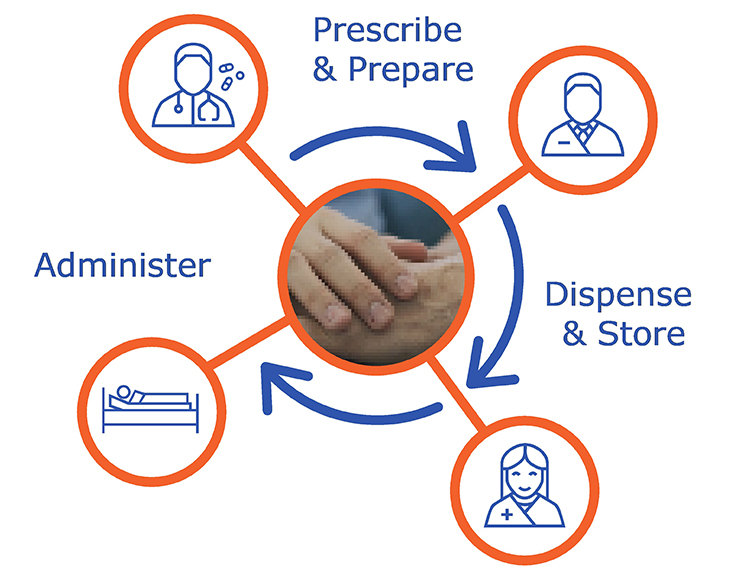What if you could improve certainties in your hospital workflows using Connected Medication Management?
Everyday, hospital executives face conflicts and uncertainty in their facilities
- Year over year investments in HIT have been substantial, and many would argue necessary for a variety of reasons. Yet these investments don’t translate to less medication errors. In fact, studies show that the rate of errors has only decreased by 7%1,2
- Medication management workflows can be complicated, with up to 50 steps between the point of order and the patient.3 There is a 49% chance of error in some crucial parts of this process.4
- 7% infusions are compounded in error5 and 10.44% of compounded preparations contain errors with potential critical impact.6
Free up time to care
The Connected Medication Management approach utilises automation and digitalisation to streamline the medication process. This reduces the potential of medication errors and generates actionable insights which in turn improves efficiency and a positive working environment.


King Faisal Specialist Hospital & Research Center opens a new era in medication management
- Reliable medication availability
- Authorised access anywhere, anytime
- Improved control of N&C medication use
- Streamlined pharmacy and anesthesia workflow
- Patient-centered nursing workflow
- Optimised data-driven inventory
Implementing Connected Medication Management in your hospital could lead to
- Real-time data from medication management and inventory software can support your teams in checking delivery statuses and reducing unnecessary interruptions. A holistic / streamlined approach reduces products being returned to central pharmacy by 30%.7
- 53% less medical administration errors when implementing automated dispensing cabinets (ADC) in the hospital.8
- Smart pumps implementation has proven effective in intercepting high-risk drugs programming errors. In a paediatric unit, 283 errors were intercepted over a 62-month observation. High-risk drug were involved in 58% of prevented errors.9
At BD, we provide a new technological approach to scale your hospital’s transformation and reinforce your peace of mind: providing high-quality, safe patient care while reducing medication errors and enhancing inventory management.
What if you could help to reduce the burden of constant change, unpredictable workload and burnout for your staff?
What if you could improve hospital efficiency, giving your staff data-led insights?
Sign up to receive the King Faisal report



